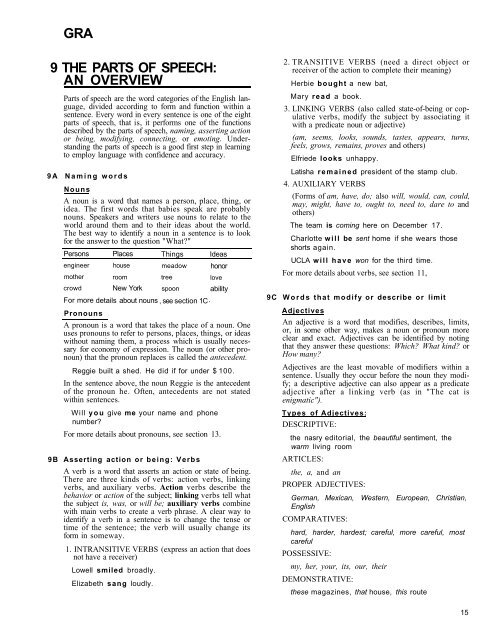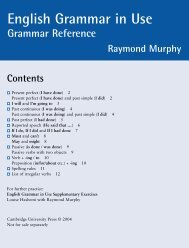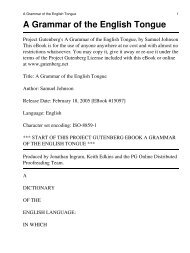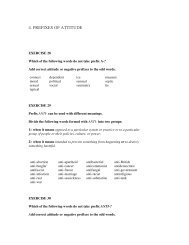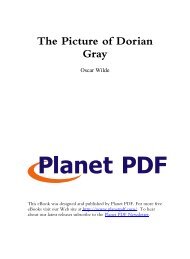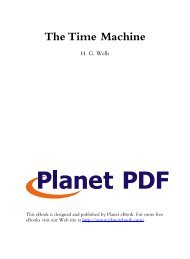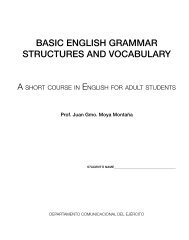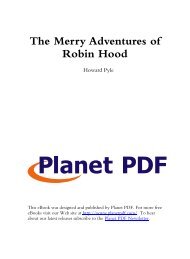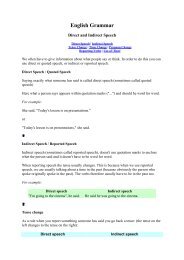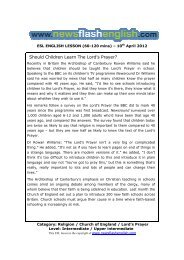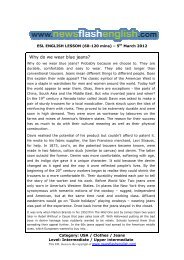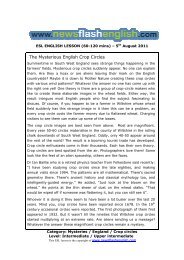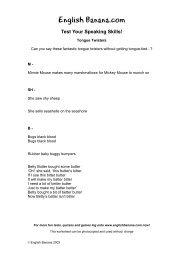TO DOWNLOAD - 75 Pages (928kb - PDF format) - ESL Teachers ...
TO DOWNLOAD - 75 Pages (928kb - PDF format) - ESL Teachers ...
TO DOWNLOAD - 75 Pages (928kb - PDF format) - ESL Teachers ...
You also want an ePaper? Increase the reach of your titles
YUMPU automatically turns print PDFs into web optimized ePapers that Google loves.
GRA9 THE PARTS OF SPEECH:AN OVERVIEW9AParts of speech are the word categories of the English language,divided according to form and function within asentence. Every word in every sentence is one of the eightparts of speech, that is, it performs one of the functionsdescribed by the parts of speech, naming, asserting actionor being, modifying, connecting, or emoting. Understandingthe parts of speech is a good first step in learningto employ language with confidence and accuracy.Naming wordsNounsA noun is a word that names a person, place, thing, oridea. The first words that babies speak are probablynouns. Speakers and writers use nouns to relate to theworld around them and to their ideas about the world.The best way to identify a noun in a sentence is to lookfor the answer to the question "What?"PersonsengineermothercrowdPlaceshouseroomNew YorkFor more details about nouns , see section 1C .PronounsThingsmeadowtreespoonIdeashonorloveabilityA pronoun is a word that takes the place of a noun. Oneuses pronouns to refer to persons, places, things, or ideaswithout naming them, a process which is usually necessaryfor economy of expression. The noun (or other pronoun)that the pronoun replaces is called the antecedent.Reggie built a shed. He did if for under $ 100.In the sentence above, the noun Reggie is the antecedentof the pronoun he. Often, antecedents are not statedwithin sentences.Will you give me your name and phonenumber?For more details about pronouns, see section 13.9B Asserting action or being: VerbsA verb is a word that asserts an action or state of being.There are three kinds of verbs: action verbs, linkingverbs, and auxiliary verbs. Action verbs describe thebehavior or action of the subject; linking verbs tell whatthe subject is, was, or will be; auxiliary verbs combinewith main verbs to create a verb phrase. A clear way toidentify a verb in a sentence is to change the tense ortime of the sentence; the verb will usually change itsform in someway.1. INTRANSITIVE VERBS (express an action that doesnot have a receiver)Lowell smiled broadly.Elizabeth sang loudly.2. TRANSITIVE VERBS (need a direct object orreceiver of the action to complete their meaning)Herbie bought a new bat,Mary read a book.3. LINKING VERBS (also called state-of-being or copulativeverbs, modify the subject by associating itwith a predicate noun or adjective)(am, seems, looks, sounds, tastes, appears, turns,feels, grows, remains, proves and others)Elfriede looks unhappy.Latisha remained president of the stamp club.4. AUXILIARY VERBS(Forms of am, have, do; also will, would, can, could,may, might, have to, ought to, need to, dare to andothers)The team is coming here on December 17.Charlotte will be sent home if she wears thoseshorts again.UCLA will have won for the third time.For more details about verbs, see section 11,9C Words that modify or describe or limitAdjectivesAn adjective is a word that modifies, describes, limits,or, in some other way, makes a noun or pronoun moreclear and exact. Adjectives can be identified by notingthat they answer these questions: Which? What kind? orHow many?Adjectives are the least movable of modifiers within asentence. Usually they occur before the noun they modify;a descriptive adjective can also appear as a predicateadjective after a linking verb (as in "The cat isenigmatic").Types of Adjectives:DESCRIPTIVE:the nasry editorial, the beautiful sentiment, thewarm living roomARTICLES:the, a, and anPROPER ADJECTIVES:German, Mexican, Western, European, Christian,EnglishCOMPARATIVES:hard, harder, hardest; careful, more careful, mostcarefulPOSSESSIVE:my, her, your, its, our, theirDEMONSTRATIVE:these magazines, that house, this route15


